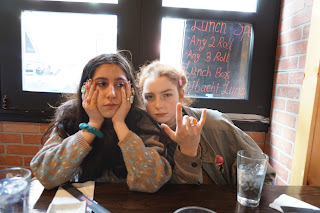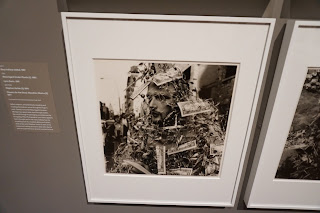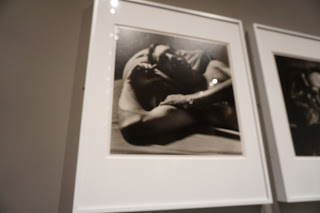 |
| Scenes of the city and water, people and art by Peter Hujar at the Morgan Library. |
From the series Arthur Rimbaud in New York (1978-79). Photograph: David Wojnarowicz/Courtesy of the estate of David Wojnarowicz and P.P.O.W Gallery, New York
Over the last few weeks, the topic of
alienation has been everywhere.
People feel alienated from government,
work, the unions, the social supports that keep us together, the immigrants
making their way here, building the city itself.
Some reach for guns, the machine guns that
help them feel powerful.
Others, including the kids who saw their
friends shot last week, are calling bullshit on the politicians offering
thoughts and prayers. Hopefully these
kids can change the dynamic in congress. Walkouts are planned for March 14th
and April 20th across the country.


Robert AyersRise and Resist The two new signs for Not-my-President's Day ...
 |
|
The lie-in crowd has grown - dozens now on the ground. Others started chanting "shame on you" outside White House.
|
Its terrifying to know that our government
has established de facto policy of allowing gunmen to bring automatic weapons
to mow you down when you enter school.
But by offering unrestricted access to weapons, this is exactly our
policy.
In other spaces, people have tried to pull
together. At our union, we’ve debated what we can do to move from a service to
movement orientated model in which we are all seen as leaders. Yet, this is exactly what we all have to do,
become involved. Only with full
involvement can unions feel like dynamic movements, not top down, bureaucratic
organizations. With the supreme court set to rule against public sector unions
in the Janus case, everyone will need to become involved. Union membership matters. There may
be little staff left to call unless we maintain our membership base.
Oral arguments in the Janus case begin
next week. The case involves an argument about public sector unions.
The Janus case is a reminder about the need to to rebuild
membership from the bottom.
Workers face a decision, to sign or not to
sign. If workers forgo union membership,
they gain approximately a thousand dollars a year not paying membership
dues. But what they lose is the ten
percent increases, they get with collective bargaining for better wages. As my
friend Scott puts it to his members at York college, “Who are you doing to call
when the president laughs at your request for a raise without the union?
As my friend Ron Hayduck puts it: “Would you take a $2k tax cut for a few
years or have that $2k every year? Americans will have fewer such choices after
the Supreme Court rules on the Janus case, unless working people mobilize to
defend unions and grow them big time. We can do this—we’ve been here before.”
As the New York Times recalled in an article
entitled: “6 Reasons That Pay Has Lagged Behind U.S.
Job Growth.”
“A collapse
in the rate of union membership for private-sector employees — to 6.5 percent
last year from the upper teens in the early 1980s — appears to have played a
key role in holding down wages. This is partly because unions benefit workers
directly: Average pay for workers represented by unions
tends to be higher than for those who aren’t, even after controlling for education and other
characteristics. But unions also benefit workers indirectly. In industries and
regions where unions have a larger presence, pay tends to be higher for all
low- and medium-wage workers, not just those represented by unions.”
“…wages for
men employed in the private sector who are not union members would have been 5
percent higher on average — about $2,700 per year — by 2013 if unions had the
same reach as in the late 1970s. (The figure excludes senior managers.) For men
with only a high school diploma or less, that figure rose to nearly $3,200.”
In response to the oral arguments in the
Janus case at Supreme Court, our union is taking four steps this week.
1)
We
are asking members to recommit to union. The single most important thing our members can do right now to
build the power we will need for this round of bargaining is sign the PSC’s
new membership card.
2)
We
are rallying with other union members at Foley Square on Saturday the 24th
of February at 11 AM.
3)
We
are traveling to DC on Sunday the 25th to be an active presence in
front of the court on the 26th for oral arguments.
4)
And
we are organizing on campus, talking with members.

Why do so?
Without movements to protect us, we struggle alone in a cold indifferent
city. Saturday, I joined some friends at the Commons to talk about Marx’s Economic and Philosophical Arguments of
1944. Here a young Marx sums
up the arguments of Adam Smith and David Ricardo. Given the mood of the day, his arguments are
worth exploring. There is much he agreed
with Smith, exploring historical categories of value, profit, and property.
Smith recognized work within a system of an invisible hand, providing goods for
demands. A moral philosopher, Smith assumed
the invisible hand would make for a more equitable society. Yet, within the
expanding income inequality we see today, it is hard to see this bearing
out. On the other hand, Marx saw a class
struggle as necessary for workers to make gains. Describing the conditions of “Estranged Labor”
Marx noted that what pollical economy does not explain is that labor creates
value. Labor creates wealth. The problem
is, “the worker becomes an even cheaper commodity the more the commodies he
creates. The devaluation of the world of
men is in direct proportion to the increasing value of the world of
things. Labor produces only
commodities; it produces itself and the worker is a commodity.”
When things become objects, this way of
thinking that can be described as reification.
Here our very essence becomes commodified, as Lukacs
describes:
“…his
qualities and abilities are no longer an organic part of his personality, they
are things which he can “own” or “dispose of” like the various objects of the
external world. And there is no natural form in which human relations can be
cast, no way in which man can bring his physical and psychic “qualities” into
play without their being subjected increasingly to this reifying process….”
As result, we become estranged from our work and ourselves. Marx continues
“This fact expresses merely that the object
which labor produces – labor’s product – confronts it as something alien,
as a power independent of the producer. The product of
labor is labor which has been embodied in an object, which has become material:
it is the objectification of labor. Labor’s realization is
its objectification. Under these economic conditions this realization of labor
appears as loss of realization for the workers[18];
objectification as loss of the object and bondage to it; appropriation
as estrangement, as alienation.[19]”
Workers no longer feel a sense of
ownership of their labor; instead they confront it as something alien.
“His labor is therefore not voluntary, but
coerced; it is forced labor. It is therefore not the
satisfaction of a need; it is merely a means to satisfy
needs external to it. Its alien character emerges clearly in the fact that as
soon as no physical or other compulsion exists, labor is shunned like the
plague. External labor, labor in which man alienates himself, is a labor of
self-sacrifice, of mortification. Lastly, the external character of labor for
the worker appears in the fact that it is not his own, but someone else’s, that
it does not belong to him, that in it he belongs, not to himself, but to
another. Just as in religion the spontaneous activity of the human imagination,
of the human brain and the human heart, operates on the individual
independently of him – that is, operates as an alien, divine or diabolical
activity – so is the worker’s activity not his spontaneous activity. It belongs to another; it is the loss of his
self.”
The
text explores dynamics of alienated labor, in material and psychological terms,
as well as of social relations.
There
is no paradise lost, but a sense of separateness. People feel a separateness from the land in
which they grew. A strangeness takes shape as workers become separate from
products or consequences of their products. We feel separate from the food we
eat, imported from places unknown. Machine gun owners feel separate from the
slaughtered bodies of those kids who become causalities of their products. Workers become separate from the things we
made that we knew. We feel separate from
the dirt bearing our ancestors, ashes to ashes, dust to dust, the trees
extending their lives into the skies. We
exist in class relations. Employed in
three gigs at a time, workers work longer hours. Kids feel separated from the
culture, schools, their colleagues, their neighbors, their classmates. The particularly estranged one lash out with
guns.
As
Sarah Schulman writes
“So the killer’s
father died 3 years ago. He started posting scary racist images of guns
andhurting
animals. Then his
mother died 3 months ago. His girlfriend broke
up with him and got a new
boyfriend. He started telling people he
wanted to shoot up the school. He got expelled. Who
expel a messed up kid whose parents just
died? What do we do with people who
cannot handle immense pain and loss? Kick
them to the curb and let them buy guns?”
Immigrants
are separated from their families, our country separated from its heritage of
decency.
Garrett Wilkinson writes:
Look at this picture. Save it. Burn
it into your brain and never fucking forget it.
Kansas elementary school student
Fareed Jamal drew it for his dad, Dr. Syed Jamal, who is in jail and
facing deportation to Bangladesh. His family watched ICE drag him away on his
front lawn as he was taking his little girl to school in Lawrence. They
wouldn't let his wife and kids hug him goodbye.
Dr. Jamal has worked in the US for
30 years as a molecular biologist and has done research with the University of
Kansas, Children’s Mercy, and Rockhurst University. He volunteers at his
children’s schools. He is a leader within his faith community. He leaves behind
his wife and three children. They are “devastated and fearful.” They have no
other source of income.
We should remember President
Donald J. Trump promised us this. And our entire Kansas
Congressional delegation ignored his racist, hate-filled rhetoric towards
immigrants of color and gave him their full support to win the Presidency. All
so they could get tax cuts for their campaign donors.
Senator Jerry Moran, Senator Pat Roberts, Congressman Kevin Yoder, Lynn Jenkins, Congressman Roger Marshall, M.D., Congressman Ron Estes, and everyone else
who supported Donald Trump's candidacy: history will remember you for your
complicity. It will remember all of us for failing to stop this racist assault
on immigrant families.
There's still a shred of hope for
Dr. Jamal. The least you can do is share this petition: https://www.change.org/p/ice-help-to-stop-the-deportation-o…
And we still have a DACA fight to
win. There are hundreds of thousands of people left to protect. Keep fighting.
I'll leave you with what Dr. Jamal's
son wrote in a plea for support from Kansans:
"My name is Taseen Jamal, and
my father has recently been arrested, taken to the Morgan County, MO, jail, and
is being considered for deportation. My little brother cries every night, my
sister can't focus in school, and I cannot sleep at night. My mother is in
trauma, and because she is a live organ donor, she only has one kidney, so the
stress is very dangerous. She could die if he is deported. If my father is
deported, my siblings and I may never get to see him again. He is an older man,
and due to the conditions of his home country, he might not be able to survive.
My father called us, and he was crying like a little child because he was
thinking about what would happen to us if he got deported. If he gets sent back
to Bangladesh, his home country, he will be in grave danger, and people of his
kind are persecuted there. My dad could likely would face persecution or even
death at the hands of radical Islamist extremist gangs back in Bangladesh due
to his liberal and secular writings and postings on social media platforms and
publications. We are the children of Syed Ahmed Jamal, and we are requesting on
behalf of our family for your kind help to get back our father. A home is not a
home without a father."
We
are a body – capitalism is polluting our body – displacing selves from the
land, separating, devaluing, and commodifying ourselves.
Marx
writes:
“Nature is man’s inorganic body
– nature, that is, insofar as it is not itself human body. Man lives on
nature – means that nature is his body, with which he must remain in continuous
interchange if he is not to die. That man’s physical and spiritual life is
linked to nature means simply that nature is linked to itself, for man is a
part of nature.”
Loss is everywhere in Marx’s deep ecology.
“Just as he creates his own production as the
loss of his reality, as his punishment; his own product as a loss, as a product
not belonging to him… Just as he estranges his own activity from himself, so he
confers upon the stranger an activity which is not his own.”
We all do. In community mental health class, my
students and I talk about the etiology of neuroses. Does it stem from the inside – the family
romance – that Freud describes – or the alienated social relations that Marx
describes? Its hard to say.
Regardless,
we are separated from each other.
I
thought about this all weekend, walking to Judson on Sunday with the girls, thinking
walking lost in the wilderness, temptations in the wilderness that Mark
describes in the Gospels.
The
kids and I spent the afternoon exploring a few of these dynamics, looking at
art, walking up 5th Avenue to the Morgan Library, playing cards at
the Commons, eating Sushi, winding around the East Village home of my activist
heros, David Wojnarowicz, whose stories about selling
his body to elder man in Times Square, seem to embody the kinds of
alienated labor Marx and Lukacs describes.
Olivian
Laing writes:
From the series Arthur Rimbaud in New York (1978-79).
Photograph: David Wojnarowicz/Courtesy of the estate of David Wojnarowicz and
P.P.O.W Gallery, New York
His
boyfriend, Peter Hujar, documented his world. The kids and I explored Hujar’s photographs
of his friends, the stories of the piers, the artists, the writers, the downtown
scene. Number two took pictures, we laughed, we talked about the images of
Candy Darling on her Deathbed.
Finishing, we explored Tenneesee Williams show, recalling Marlon’s
screams for Stella and wandered through the East Village, stopping at Second
Ave and 12, where Hujar used to live, creating a world of images of friends and
lives, battling and embracing that strangeness in every way they knew.
 |
| images of naples... |
 |
| and then there was WHAM...! I still think they were bad boys. |











































































































No comments:
Post a Comment